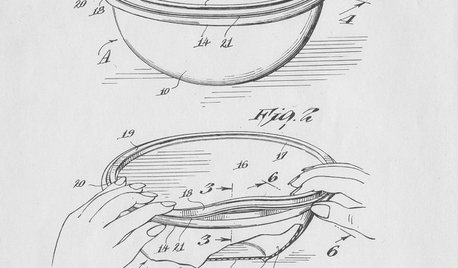The Little Stranger by Sarah Waters
friedag
14 years ago
Related Stories

LIFEYou Said It: ‘Give the Kitchen a Little Wake-Up Call’ and More
Design advice, inspiration and observations that struck a chord this week
Full Story
DECORATING GUIDESFeeling Knotty? Add a Little Rope to Your Decor
Neutral, natural and often unexpected, rope is an all-purpose accent on land or sea
Full Story
SAVING WATERXeriscape Gardens: How to Get a Beautiful Landscape With Less Water
Conserve water and make gardening much easier with the xeriscape approach’s 7 principles
Full Story
PATIO OF THE WEEKWater and Fire Mingle in a Canadian Front Yard
If the illuminated moat winding through this Ontario patio doesn't dazzle you, the 8-foot-wide fireplace will
Full Story
MOVINGMaking a Home Away From Home
Feeling like a stranger in a strange land? These tips can help ease the transition after a big move
Full Story
FEATURESHow Tupperware’s Inventor Left a Legacy That’s Anything but Airtight
Earl S. Tupper — and his trailblazing marketing guru, Brownie Wise — forever changed food storage. His story is stranger than fiction
Full Story
METALCopper: A Traditional Metal Gets a Shiny Update
Although the metal is no stranger to home design, these days its uses are downright brilliant
Full Story
SMALL HOMESHouzz Tour: Caretaking and Compact Living on a Historic Estate
Strangers sometimes wander in, but this bright and cozy New Hampshire home comes with benefits too
Full Story
FARM YOUR YARDCollecting Rainwater and Eggs From a California Chicken Coop
See how a butterfly roof helps a hen home’s design soar into double-duty territory
Full Story




carolyn_ky
kren250
Related Discussions
Strangers picked all my cherries. Law?
Q
What will you book group be reading this year?
Q
What books are you looking forward to this summer?
Q
CLVIII...Dog Days of Summer
Q
georgia_peach
friedagOriginal Author
carolyn_ky
friedagOriginal Author
lydia_katznflowers
carolyn_ky
friedagOriginal Author
georgia_peach
georgia_peach
carolyn_ky
lydia_katznflowers
friedagOriginal Author
friedagOriginal Author
georgia_peach
carolyn_ky
J C
lydia_katznflowers
friedagOriginal Author
J C
friedagOriginal Author
J C
jlsch
J C
froniga
J C
georgia_peach
carolyn_ky
friedagOriginal Author
phaedosia
J C
georgia_peach
friedagOriginal Author
carolyn_ky
angiebellica_yahoo_com
friedagOriginal Author